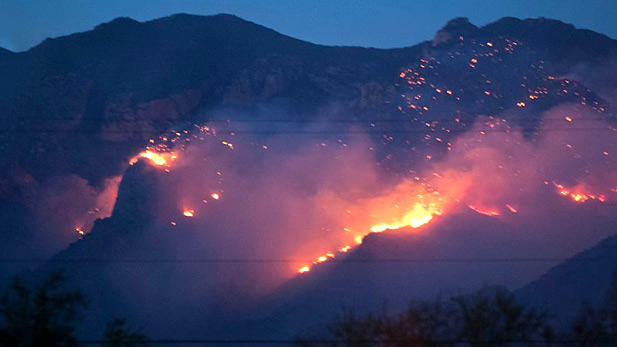 A lightning-caused fire burns near Finger Rock in the Catalina Mountains; August 5, 2015.
A lightning-caused fire burns near Finger Rock in the Catalina Mountains; August 5, 2015.Listen:
By Melissa Sevigny, Arizona Science Desk
A Flagstaff-led study predicts wildfires will dramatically increase soil erosion in the American West.
The study predicted two-thirds of watersheds will see at least a 10 percent increase in erosion by 2050. A quarter of watersheds will see a 100 percent increase.
Scientists expect climate change to bring larger and more frequent wildfires to the western U.S. This study is the first to compare those predictions with models for soil erosion.
“We know that one of the things that happens after wildfires is there can be a lot of erosion, and a lot of that soil can accumulate in downstream streams, lakes, reservoirs,” said Joel Sankey, a research geologist with the U.S. Geological Survey in Flagstaff who led the research. “That can have all sorts of impacts on the ecosystem and the watersheds themselves.”
The research team plans to study those impacts in vulnerable communities. Sankey said high-elevation forested areas such as Flagstaff are “hot spots” for fire-related erosion.
The research will be presented next week at the American Geophysical Union meeting.
The Arizona Science Desk is a collaboration of public broadcasting entities in the state, including Arizona Public Media.

By submitting your comments, you hereby give AZPM the right to post your comments and potentially use them in any other form of media operated by this institution.